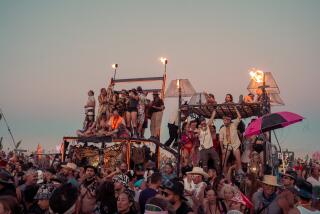Bias Killed Mountain Camp Plan, Suit Says : Civil rights: Brotherhood Crusade alleges that San Bernardino County rejected its proposal for a rustic getaway because visitors would be black.
Looming high above the smog and asphalt of the Los Angeles Basin, the San Bernardino Mountains have for decades been host to Girl Scouts, church groups and other Southern Californians in countless rustic camps tucked amid evergreen groves.
In 1985, the Brotherhood Crusade, a venerable Los Angeles community service group, purchased a chunk of the mountains, a Spartan, 5-acre ranch near Crestline. The organization’s vision? To create a camp for inner-city children, families and senior citizens in need of a refuge from the gangs, drugs and violence of their urban world.
Five years have passed, and today the Brotherhood Crusade is no closer to opening its mountain sanctuary. Blocking the way, the group’s leaders contend, is a conspiracy among residents near the camp site and three San Bernardino County supervisors who allegedly opposed the project because most of the campers would be black.
On Monday, the Brotherhood Crusade brought its charges into court. In an opening statement before U.S. District Judge William M. Byrne Jr., the group’s attorney argued that plans for the camp would have been routinely approved if not for the applicants’ skin color.
Not true, retorted the county’s lawyers. The Board of Supervisors’ refusal to grant a permit for the camp was “a land-use decision” and nothing more, attorney Richard Terzian argued.
The Brotherhood Crusade, he continued, simply raised the issue of race as a diversionary tactic--”a means of obtaining a decision in its favor.”
At issue in the federal civil rights trial, expected to last at least a week, is whether the Board of Supervisors’ 1987 decision barring the camp was “racially motivated.” If Byrne concludes that it was, the county ultimately could be assessed punitive damages and be forced to permit the mountain retreat to open.
In addition to the San Bernardino County Board of Supervisors, three individuals--Supervisors Larry Walker and Jon Mikels and former Supervisor John Joyner--are named as defendants in the lawsuit.
The Brotherhood Crusade, which funds health, educational and cultural programs aimed mostly at minorities, has for nearly a decade sought to build a mountain retreat. The goal, said Eric Gaines, a consultant to the organization, is to provide youths, families and senior citizens from Los Angeles with “a bit of serenity and mountain air--the chance to take a nature walk.”
The 5-acre Crestline site, located in a scenic, wooded draw called the Valley of Enchantment, suited the Brotherhood Crusade’s purposes perfectly. Formerly a dude ranch, the property had cabins, a swimming pool and other facilities that merely needed some upgrading. After purchasing the ranch for $350,000, the organization set about making improvements.
Before long, however, word of the camp proposal spread, and a hornet’s nest of trouble erupted.
The bulk of the opposition came from residents of a neighboring mobile home park, who, declaring their concern about noise from the proposed camp, began circulating petitions expressing opposition to the project.
A community governing group, concluding that the camp would clash with the residential character of the valley, also took a stand against it, and local newspapers were filled with full-page ads urging residents to fight the proposal.
The Brotherhood Crusade, its attorneys argued Monday, addressed each community concern, hoping to pacify its opponents. The group agreed, among other things, to place a ceiling on camp attendance, plant landscaping to mute noise and provide notice of special events. But nothing, the group’s leaders maintain, satisfied their opponents.
“Every time my clients did something the county or community requested, another hurdle was erected in their path,” the Brotherhood Crusade’s Los Angeles lawyer, Johnny Griggs, said. “It was ridiculous.”
After two years of hearings and haggling, the Board of Supervisors ended the debate, rejecting the group’s application for a permit. The board’s decision, attorney Terzian told the judge Monday, was based on a finding that the noise generated by the proposed camp would be inappropriate in the mountain community.
An environmental impact report, he said, “concludes that the noise . . . generated by the proposed use really could not be mitigated,” Terzian said.
Supervisor Larry Walker, in a telephone interview, added that “the project was just too intensive, too high-density for that parcel.” The vote, he added, had “nothing to do with race. That just was not a factor, for me or anyone else.”
The Brotherhood Crusade, however, disagrees.
In summarizing their evidence Monday, the group’s lawyers said “a pattern” of racial slurs--made by community members at public meetings and in letters to elected officials--indicate that racial discrimination was at the root of the opposition and that county supervisors knew that when they voted on the project.
The noise issue was merely a smokescreen, they argued. A much larger camp--Camp Seely, operated by the city of Los Angeles Park and Recreation Department--and an elementary school are within half a mile of the Brotherhood Crusade’s property, they noted, and mobile home park residents had not complained about noise from those facilities.
More to Read
Sign up for Essential California
The most important California stories and recommendations in your inbox every morning.
You may occasionally receive promotional content from the Los Angeles Times.










